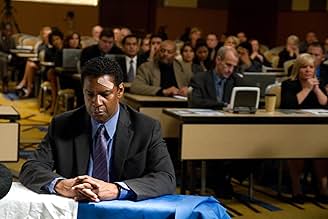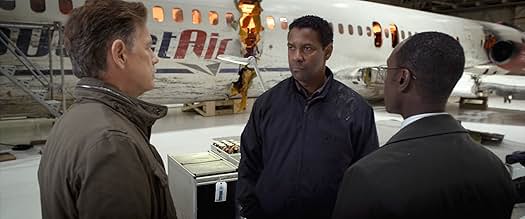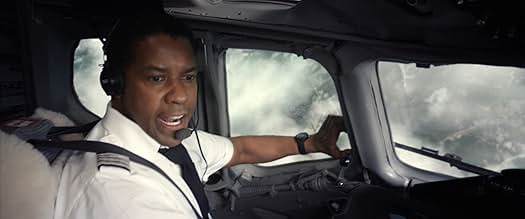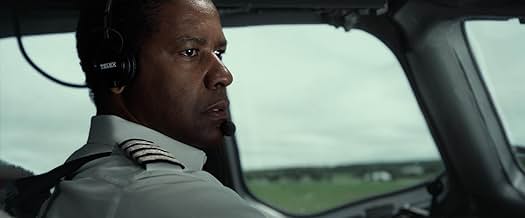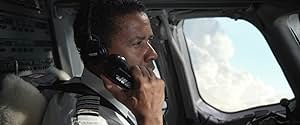Um piloto faz um difícil pouso de emergência quando seu avião tem problemas mecânicos, salvando a maioria dos passageiros. Porém, a investigação do acidente começa a revelar detalhes perturb... Ler tudoUm piloto faz um difícil pouso de emergência quando seu avião tem problemas mecânicos, salvando a maioria dos passageiros. Porém, a investigação do acidente começa a revelar detalhes perturbadores sobre sua dependência de álcool e drogas.Um piloto faz um difícil pouso de emergência quando seu avião tem problemas mecânicos, salvando a maioria dos passageiros. Porém, a investigação do acidente começa a revelar detalhes perturbadores sobre sua dependência de álcool e drogas.
- Indicado a 2 Oscars
- 15 vitórias e 45 indicações no total
Adam C. Edwards
- Father on Plane
- (as Adam Ciesielski)
Charlie E. Schmidt
- Tiki Pot
- (as Charlie E. Schmidt Jr.)
Avaliações em destaque
Washington gives what is nothing less than a performance of a lifetime in this tension filled film dealing with a pilot wrestling with inner demons. The aviation sequences are stunning and the crash one of the most breathtaking ever filmed. The director is highly gifted and his skill and passion are clearly evident. The script is superb, with intelligent plotting and sharp dialog that captures reality. It is, once again, Washington who shines here above all else. His power as an actor is what truly gives this movies its fire. His portrayal of a substance abusing addict/alcoholic is painful to watch because of the humanity he brings to the part. It is a tremendous accomplishment and one of the finest studies of addiction ever filmed.
"Flight" hinges on one question, but before I get to the question we have to set the stage.
Captain William "Whip" Whitaker (Denzel Washington), a commercial pilot, spent a night of boozing, snorting, and sex with a flight attendant. The next morning he had a flight out of Florida to Atlanta with a manifest of 102 persons. The weather was extremely rough upon take off, but not enough to ground the flight. Whip deftly maneuvered through the storm then the flight was relatively smooth after that, so Whip slept. Somewhere over Georgia the plane experienced mechanical problems and went into a nose dive. With the utmost calmness Whip pulled yet one more set of maneuvers to land the plane with minimal loss of life. Six people did die, but it could've been so much worse.
Whip's lawyer, Hugh Lang (Don Cheadle), did some maneuvering of his own and had Whip's toxicology report suppressed. The NTSB, after an extensive investigation, found that Whip performed outstandingly. They attempted with simulators to have other experienced pilots land Flight 227 and they all failed. Whip was a hero. So then, here's the question:
Was Captain Whitaker's inebriated state a matter of importance with him flying that day?
Whip was an incorrigible drunk, but a functional one after a few lines of cocaine. His problem ruined his marriage, his relationship with his son, and was threatening his freedom. It was an unshakable factor throughout the movie and one that would cause you to shake your head in pity as well as embarrassment for him.
What makes "Flight" a good movie is the question I posed because how many people in society are functioning addicts or alcoholics? I just watched "Puncture" with Chris Evans who played an addict lawyer who was superb at his job as long as he was high. Such people exist.
Flight was a top tier production with awesome performances from the likes of Denzel (naturally), John Goodman, Don Cheadle, and Bruce Greenwood. The production and acting helped make the movie standout, but the plot itself and the central question it poses makes it what it is.
Captain William "Whip" Whitaker (Denzel Washington), a commercial pilot, spent a night of boozing, snorting, and sex with a flight attendant. The next morning he had a flight out of Florida to Atlanta with a manifest of 102 persons. The weather was extremely rough upon take off, but not enough to ground the flight. Whip deftly maneuvered through the storm then the flight was relatively smooth after that, so Whip slept. Somewhere over Georgia the plane experienced mechanical problems and went into a nose dive. With the utmost calmness Whip pulled yet one more set of maneuvers to land the plane with minimal loss of life. Six people did die, but it could've been so much worse.
Whip's lawyer, Hugh Lang (Don Cheadle), did some maneuvering of his own and had Whip's toxicology report suppressed. The NTSB, after an extensive investigation, found that Whip performed outstandingly. They attempted with simulators to have other experienced pilots land Flight 227 and they all failed. Whip was a hero. So then, here's the question:
Was Captain Whitaker's inebriated state a matter of importance with him flying that day?
Whip was an incorrigible drunk, but a functional one after a few lines of cocaine. His problem ruined his marriage, his relationship with his son, and was threatening his freedom. It was an unshakable factor throughout the movie and one that would cause you to shake your head in pity as well as embarrassment for him.
What makes "Flight" a good movie is the question I posed because how many people in society are functioning addicts or alcoholics? I just watched "Puncture" with Chris Evans who played an addict lawyer who was superb at his job as long as he was high. Such people exist.
Flight was a top tier production with awesome performances from the likes of Denzel (naturally), John Goodman, Don Cheadle, and Bruce Greenwood. The production and acting helped make the movie standout, but the plot itself and the central question it poses makes it what it is.
"Flight" is a film that brought Denzel Washington an Oscar nomination...something his performance richly deserved. It's a terrific performance in a terrific, yet harrowing, film.
Whip Whitaker (Washington) is an absolute mess. Although he's an airline pilot, he's an addict and boards a plane under the influence of cocaine and alcohol. He's so badly impaired that during the flight, he managed to sneak MORE alcohol into his body! Now here's the amazing part....the plane literally begins to fall apart in midair and through VERY quick thinking, he manages to crash land the plane with only minimal loss of life. When Whip awakens at the hospital, he soon learns that the press is declaring that he's a hero! This film is about his actions and the airline's and the pilot union's following the crash.
The scene where the plane begins to fall apart and crashes is about the most harrowing and adrenaline-pumping scenes you'll ever see in a film. I could actually feel my chest pounding and STRONGLY recommend anyone with a fear of flying to avoid this film!!! It's well done...and it's shocking no Oscar nominations were given to the folks who created this scene!
I appreciate Denzel Washington in this film. Not only is he very good, but he really took a risk here playing such a screwed up and self-destructive guy. This was clearly a stretch for him...and it's nice to see him do something different.
Overall, this is a really amazing film...not just because of the crash but also because it really shows addiction in all its ugliness and with great realism. Among the best of 2012...though oddly apart from Washington and one minor award, the film wasn't nominated for Best Picture nor Best Director.
UPDATE: I recently found "The Pilot" on YouTube. It's a very, very similar story starring Cliff Robertson...so similar that I have to believe the writer of "Flight" was 'inspired' by it strongly. Because it's so similar, I am amending my score for "Flight" from 10 to 9....but it's still a terrific story.
Whip Whitaker (Washington) is an absolute mess. Although he's an airline pilot, he's an addict and boards a plane under the influence of cocaine and alcohol. He's so badly impaired that during the flight, he managed to sneak MORE alcohol into his body! Now here's the amazing part....the plane literally begins to fall apart in midair and through VERY quick thinking, he manages to crash land the plane with only minimal loss of life. When Whip awakens at the hospital, he soon learns that the press is declaring that he's a hero! This film is about his actions and the airline's and the pilot union's following the crash.
The scene where the plane begins to fall apart and crashes is about the most harrowing and adrenaline-pumping scenes you'll ever see in a film. I could actually feel my chest pounding and STRONGLY recommend anyone with a fear of flying to avoid this film!!! It's well done...and it's shocking no Oscar nominations were given to the folks who created this scene!
I appreciate Denzel Washington in this film. Not only is he very good, but he really took a risk here playing such a screwed up and self-destructive guy. This was clearly a stretch for him...and it's nice to see him do something different.
Overall, this is a really amazing film...not just because of the crash but also because it really shows addiction in all its ugliness and with great realism. Among the best of 2012...though oddly apart from Washington and one minor award, the film wasn't nominated for Best Picture nor Best Director.
UPDATE: I recently found "The Pilot" on YouTube. It's a very, very similar story starring Cliff Robertson...so similar that I have to believe the writer of "Flight" was 'inspired' by it strongly. Because it's so similar, I am amending my score for "Flight" from 10 to 9....but it's still a terrific story.
I am an aircraft mechanic, so admittedly I have trouble watching a movie which will undoubtedly abuse reality in terms of physics and aircraft design. I recall seeing previews for this and being stunned at the laughable scenario of an inverted passenger plane. That experience dropped my expectation to essentially zero.
When I watched this film I was surprised in two ways. Firstly, the scenario was more plausible than I had given it credit. Inverted flight is a problem for most planes because of aerodynamics. And while some aircraft are aerodynamically capable of inverted flight (even some passenger planes) it is additionally a problem because hydraulic and engine oil systems are often gravity fed. This means that if a plane is able to fly this way, most of them won't fly for long before systems begin to fail. The film did a reasonable job of portraying this as the plane was just barely able to sustain level flight with a full pitch down elevator position and displayed low engine oil press warnings which led to engine fire. I suspect the roll maneuver would require more altitude than the film suggests...but otherwise it's not far from what could happen in reality if this was actually attempted. Most engine fire T-handles are designed to instantly shut fuel and bleed air valves for an engine...which doesn't seem to happen here, but that was my biggest realism gripe.
My second surprise is that this movie has very little to do with aviation. Aviation seems to be the setting for the story, but the subject itself is substance abuse. The story could have just as easily been set around a bus driver or a ship captain. Given the fact that aviation was merely a setting for the story I have to give credit to the film makers for paying at least some attention to realism.
I thought the story was fascinating. It's the sort of film that requires something of the viewer. You can't watch this without making moral judgements and that process requires each viewer to evaluate how they feel about certain subjects. The story creates just enough moral dilemma to get people thinking and any story that can succeed in that gets a pass from me.
When I watched this film I was surprised in two ways. Firstly, the scenario was more plausible than I had given it credit. Inverted flight is a problem for most planes because of aerodynamics. And while some aircraft are aerodynamically capable of inverted flight (even some passenger planes) it is additionally a problem because hydraulic and engine oil systems are often gravity fed. This means that if a plane is able to fly this way, most of them won't fly for long before systems begin to fail. The film did a reasonable job of portraying this as the plane was just barely able to sustain level flight with a full pitch down elevator position and displayed low engine oil press warnings which led to engine fire. I suspect the roll maneuver would require more altitude than the film suggests...but otherwise it's not far from what could happen in reality if this was actually attempted. Most engine fire T-handles are designed to instantly shut fuel and bleed air valves for an engine...which doesn't seem to happen here, but that was my biggest realism gripe.
My second surprise is that this movie has very little to do with aviation. Aviation seems to be the setting for the story, but the subject itself is substance abuse. The story could have just as easily been set around a bus driver or a ship captain. Given the fact that aviation was merely a setting for the story I have to give credit to the film makers for paying at least some attention to realism.
I thought the story was fascinating. It's the sort of film that requires something of the viewer. You can't watch this without making moral judgements and that process requires each viewer to evaluate how they feel about certain subjects. The story creates just enough moral dilemma to get people thinking and any story that can succeed in that gets a pass from me.
Trailers might lead you to believe this is a film about flying. Or about an amazing flying feat. But it is all about the lead character, Captain "Whip" Whitaker (Denzel Washington), a man who is a pilot and an alcoholic. The flying and a terrible crash provide background for the story of this man, who has struggled with his illness for years.
In many ways the story is not that original. We have seen numerous stories about alcoholics and heard real-life testimonies of the behaviors that accompany alcoholism, and this film tracks with all of them.
It is worth seeing for the brilliant portrayal of Captain Whitaker and the performances of the other actors in the film. Some parts are difficult to watch because the acting is so engaging.
I also think the film raises some interesting questions that some viewers may not be willing to acknowledge. If one is an alcoholic, is the entire worth of that man nothing more than what his sickness drags him down to? Are we what we do? Can we rise above our neuroses or our worst behaviors? Often we see public figures condemned in media for indiscretions or harmful acts; is that, then, the measure of the man or woman?
The film, even if judged solely for its dramatic content, is worth seeing.
In many ways the story is not that original. We have seen numerous stories about alcoholics and heard real-life testimonies of the behaviors that accompany alcoholism, and this film tracks with all of them.
It is worth seeing for the brilliant portrayal of Captain Whitaker and the performances of the other actors in the film. Some parts are difficult to watch because the acting is so engaging.
I also think the film raises some interesting questions that some viewers may not be willing to acknowledge. If one is an alcoholic, is the entire worth of that man nothing more than what his sickness drags him down to? Are we what we do? Can we rise above our neuroses or our worst behaviors? Often we see public figures condemned in media for indiscretions or harmful acts; is that, then, the measure of the man or woman?
The film, even if judged solely for its dramatic content, is worth seeing.
Você sabia?
- CuriosidadesThe accident in the film was inspired by a real-life disaster, the crash of Alaska Airlines 261 on January 31, 2000. Some dialogue in the film closely resembles the CVR transcript. Like in the film, the pilots of Alaska 261 rolled the airplane to an inverted position to try to stabilize the flight. Unlike the film, however, this did not assist them in recovering the aircraft. The root cause of the crash was found to be inadequate maintenance of the airplane's stabilizer "jackscrew," which caused its threads to wear down excessively and eventually jam the jackscrew. While the pilots were trying to reach Los Angeles for an emergency landing, the threads were ripped out and the stabilizer moved to a position that forced the plane into its fatal dive.
- Erros de gravaçãoThe NTSB investigation portrayed in the movie includes recovered data from the Cockpit Voice Recorder. US law requires Cockpit Voice Recorders to include at least 30 minutes of audio data from both pilots and Air Traffic Control radio transmissions. Since the plane crashed in less than 30 minutes, the audio from the CVR should have included Evans and Margaret's conversation about Whip sleeping on the job. This would have raised serious questions about Whip's behavior aside from his alcohol and drug usage. However, nothing about this is mentioned at any point during the NTSB hearing.
- ConexõesFeatured in The Tonight Show with Jay Leno: Episode #21.22 (2012)
- Trilhas sonorasAlcohol
Written by Stephen Duffy & Steven Page
Performed by Barenaked Ladies
Courtesy of Warner Bros. Records Inc.
By arrangement with Warner Music Group Film & TV Licensing
Principais escolhas
Faça login para avaliar e ver a lista de recomendações personalizadas
- How long is Flight?Fornecido pela Alexa
- Who placed that enormous amount of alcoholic beverages in the adjacent room to Whip Whitaker's hotel room?
- Why did Whip thank Charlie for letting him stay at his "beautiful home" when it was obvious that it was an airport hotel room with an adjoining room?
- What happened to Nicole after she left Whip?
Detalhes
- Data de lançamento
- Países de origem
- Centrais de atendimento oficiais
- Idioma
- Também conhecido como
- El vuelo
- Locações de filme
- Empresas de produção
- Consulte mais créditos da empresa na IMDbPro
Bilheteria
- Orçamento
- US$ 31.000.000 (estimativa)
- Faturamento bruto nos EUA e Canadá
- US$ 93.772.375
- Fim de semana de estreia nos EUA e Canadá
- US$ 24.900.566
- 4 de nov. de 2012
- Faturamento bruto mundial
- US$ 161.772.375
- Tempo de duração2 horas 18 minutos
- Cor
- Mixagem de som
- Proporção
- 2.39 : 1
Contribua para esta página
Sugerir uma alteração ou adicionar conteúdo ausente







